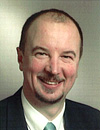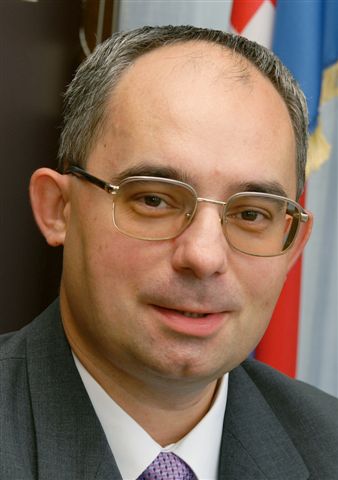Electronic communications market in Croatia still grows in spite of unfavourable business environment. Digital dividend opens some new business opportunities for significantly faster further development of electronic communications by introduction for new technologies and increasing density of broadband accesses to Internet, thus leading to bigger Gross Domestic Product. However, the road to this goal is paved with number of catches and barriers, thus creating big challenges for all sector's stakeholders in Croatia.
 |
Mr. Lučić holds a Ph.D. degree from the Faculty of Electrical Engineering and Computing at University of Zagreb, Department of Telecommunication. His career in telecommunication industry started in 1987 at Ericsson Nikola Tesla in Zagreb, Croatia, and was continued with internationally assignments for Ericsson. In more than 20 years in the industry he was mostly responsible for business development and sales to the leading telecommunication operators in European Union and in Israel. He is Executive Director of Croatian Post and Electronic Communications Agency since 2009. |
In June 2010, ANCOM proposed the creation of a regional portal dedicated to the Digital Dividend in our region as well as a regional group to create and administrate it. The countries in the region agreed the idea and, during the spring of 2011, ANCOM invited the regulatory bodies in our region to join the regional project. An in-house version of the portal was also sent. Later on, on May 12th 2011, the working group had its kick-off meeting in Bucharest and agreed on cooperation rules and the portal content. Now, CEE Regional Working group encompasses 12 regulators from 11 countries in our region, while www.CEERegionalWorkingGroup.net is under construction, the first sets of documents being already uploaded.
|
|
Dr. Nicolae Oacă has been a strategy counselor to the President of ANCOM - the Romanian telecom regulator - since July 2009.
Dr. Oacă holds a PhD in telecommunications engineering from the Polytechnic University of Bucharest, and a MBA degree awarded by the Université du Québec à Montréal, Canada (he completed the Canadian MBA Program). Nicolae Oacă is also an associate professor at the Polytechnic University of Bucharest. Between 1998 and 2003, dr. Oacă held the position of counsellor for strategy to the CEO of Romtelecom. Until 1998, he was a researcher within the INSCC, the Romanian national research institute in communications. |
| After 1996, he was involved in restructuring the Romanian telecommunication sector, becoming an opinion former and an informal advisor to the telecommunication authorities.
since 2009. He was a Guest Editor for the “Telecommunications in Central & East Europe” feature topics published in the IEEE Communications Magazine in August 2000. In November 2000, he was invited to join the board of IEEE Global Communications Newsletter, a monthly telecommunication newsletter published in the IEEE Communications Magazine. Between 2005 and 2006, he was the Editor of Global Communications Newsletter (http://www.comsoc.org/pubs/gcn/gcn0105.html). |
|
Cell internal language organization CILO
Origin of life and consciousness
Background and Purpose: This work develops the new genetic intelligence theory as a complement to the genetic code theory.
Material and Methods: The genetic intelligence is organized in the nested, fractal cell event trains CET. The trains are compared with the send and receive windows measured on the firefly Photuris versicolor.
Results: The new GENIUS+ theory is developed. It covers the cell, brain and behaviour; hence it is universal. The cell intelligence is composed of the intelligence links; related to the length, locus, loop, distance; and to the cell working associators and memory. The primary, window and answer oscillators generate the sequences of send and receive windows. They are entrained by the stimulus and they define the latency of the answer. The initial phase is determined by the contents of memories. The frequency of cell consciousness is 5,7 cycles per 1000 nm.
Conclusion: The human genes and the mouse genes are 99 per cent similar in DNA codes. Yet the human GENIUS+ intelligence links are different from the mouse GENIUS+ intelligence links. These are two different building, linking plans, producing two different lives: human and mouse. The GENIUS+ is a missing link between the genome and proteome. The cell Primary waveforms and oscillations are responsible for an inherent time, space, link program that controls the communication and the behavior of cell agents. The Primary waveform also controls the relationship between the stimulus and the response by narrowing and widening the receive and send windows. Hence the Primary waveform presents the basic, precise, and quantitative description of a part of the cell Self Organization SO. Three waveforms (primary, window, answer), lead complex segments of the cell SO. They define the Cell Internal Language Organization CILO.
|
|
Branko Soucek, Professor of the Computer and Brain Networks, at the Universities of Zagreb, New York and Arizona. Expert for the United Nation Agencies UNIDO, and IAEA. Researcher and consultant for the NASA, IBM, Siemens, Schering, Brookhaven National Laboratory, Institute Ruder Boskovic. Prof. Soucek has published 10 books with Wiley Inc., New York: mini and micro computers, neural networks, real time systems, genetic programming, object recognition, neurobiology, learning, mind. His books have been translated into the Croatian, Russian and Japanese languages in over 100.000 copies. Prof. Soucek biography is included in the: 1. “International Scientist of the Year for 2003”, England; 2. “Who is Who in the World 2003”,USA; 3. “Who is Who in Science and Engineering 2003”, USA. |
| His achievements include authoring and discovering the brain internal language organization bilo; the brain mind attractions brama; the brain event train bet; the brain mind tissue tiss; the brain mind self organization so; the computer mega associator. | |
Within the monitoring of fulfilment of obligation pertaining from the negotiation process in Chapter 10 - Information Society and Media, the Republic of Croatia has been obliged to transpose the revised EU regulatory framework of November 2009 into the Croatian legislation, by adopting the Act on Amendments to the Electronic Communications Act. By adopting this Act, Croatia aligned its legislation in the field of electronic communications almost in parallel with EU member states (furthermore, even before the number of EU member states), due to the level of development of this sector in Croatia and its readiness for the current EU processes in the regulation of electronic communications market. These Amendments further strengthen the independence, autonomy and effectiveness of the national regulatory authority in performance of its regulatory and other tasks, while particular attention is paid to additional measures for the protection of service users' rights, including disabled persons. Also, conditions for strengthening the market of single electronic communications networks and services are created, by stimulating efficient and sustainable market competition. As a consequence, the competition in national economy will increase as a whole, new possibilities for operators to use modern and innovative communications services and technologies will be created, which would enable lower charges for consumers, higher level of quality of service and large diversity of new services, contributing directly to the standard of life and work for citizens, as well as to the better business conditions.
 |
Krešo Antonović graduated from the Zagreb University – Faculty of Electrical Engineering and Computing (FER) in 1994 (in the field of radiocommunications and professional electronics). He joined the Ministry of the Sea, Transport and Infrastructure (MSTI) in 1994, in the beginning as an expert assistant, expert advisor and senior advisor (until 2003), Head of Information Society Development Department (2003-2004), Head of Electronic Communications Department (2004-2008) and as of 2008, Director of the Electronic Communications and Postal Service Directorate in MSTI. Mr. Antonovic is actively involved in coordination and drafting of the primary and secondary legislation in the field of electronic |
| communications networks and services, as well as postal services, and their alignment with the relevant EU acquis and standards, particularly by participating in the process of screening and negotiations under Chapter 10 (Information Society and Media), Chapter 21 (Trans-European Networks) and Chapter 14 (Transport Policy), as a member of respective working groups. He is appointed a Chairman of the Working Group of MSTI on drafting the new National Broadband Access Strategy. Also, he was a chairman of the Working Group of MSTI on drafting the National Television Broadcasting Switchover Strategy in 2008. In the area of international cooperation, Mr. Antonovic has been actively participating in all major ITU and CEPT conferences and assemblies (including plenipotentiary conferences and radiocommunications conferences on global and regional level). He is an observer at COCOM and member of several Croatian professional societies (MIPRO, ELMAR, MENSA). He also served as a chairman of technical committee of the Croatian Standards Institute, in parallel with his membership in several other technical committees. He has published six expert papers at MIPRO and ELMAR international conferences in Croatia, covering digital radio and TV broadcasting, radio frequency spectrum management and quality of service in telecommunications. | |
New services and models among key stakeholders in ICT effect with the need for user data consolidation with the goal of evolution of innovative services. Development of services nowadays is very dynamic, therefore consolidation of user data enables time to market, transparency and orientation to customer experience enrichment.
Development of new mobile data services (multimedia services, business applications, ...) is demanding unavoidable need for mobile broadband service in rural area. Mobile operations are handling this challenge on different way having different experiences, but mostly based on introduction of UMTS 900 access technology and in nowadays deploying mobile broadband on digital dividend. Today's analysis and predictions are showing that in 2020 market will demand 1000 more mobile traffic.



